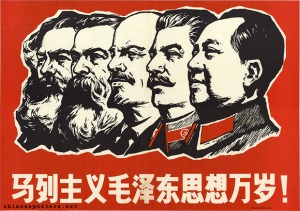This essay is Part 2 of a three-part series on socialism:

Theorists and socialist leaders in the Communist ideological tradition.
In the first essay in this series, I gave the definition of socialism offered in the Oxford English Dictionary and explained why the essential idea of socialism is immoral. Even in it’s “purest” and most democratic form, socialism is inherently unjust and will lead to mass poverty.
In this essay, I will explain why many historical examples of countries that called themselves “socialist,” such as the Soviet Union and China, were in fact socialist, (contrary to the protestations of many of today’s socialists) and explore why the more consistent implementations of socialism have always resulted in dictatorship, oppression and corruption.
Again from the Oxford English Dictionary, socialism is defined as:
A political and economic theory of social organization that advocates that the means of production, distribution, and exchange should be owned or regulated by the community as a whole.
First, let’s look at what this definition does not say: It does not say that everyone must have equal wealth or income. It does not say that money must be abolished. It does not say that the state or political leadership must be abolished. (The abolition of the state and political leadership were supposed to be features of Marx’s communist utopia that would arise out of socialism.)
A key part of what the definition does say, that gives us a clue to the basic idea underlying socialism, is the last part: “owned or regulated by the community as a whole.” Socialism is based on the idea that the community as a whole has interests apart from individual interests, and at least in some cases, community interests override individual interests. A community as a whole can allegedly make decisions that protect or further those interests. This forms the basis for why socialist ideologies believe that the community as a whole has the right to own and regulate property.
The idea that the community as a whole (or any other group) has interests, rights, and the ability to make decisions apart from individuals, is called collectivism. Collectivism treats the group–in this case, the community–as though it were a single living organism, with individuals as parts or cells of its body. Under this view, the individuals are inherently dependent on the whole for everything in their life. Individuals’ choices are entirely determined by their circumstances and place in the community, and separation from the community means a loss of personal purpose and rapid death for an individual. Thus, the community, as the agent responsible for everything an individual is, has the right to determine how goods and services will be produced and distributed.

 Socialism has become more popular in the US recently, at least as a term people use for their political beliefs. Bernie Sanders and many of his young followers claim to be socialists. But what is socialism, really, and is it a moral system or an immoral one? Is it practical or impractical?
Socialism has become more popular in the US recently, at least as a term people use for their political beliefs. Bernie Sanders and many of his young followers claim to be socialists. But what is socialism, really, and is it a moral system or an immoral one? Is it practical or impractical?